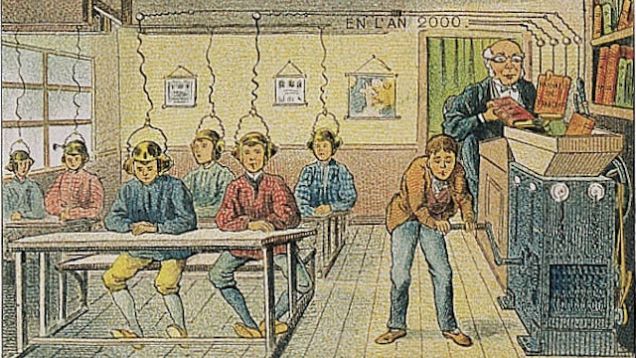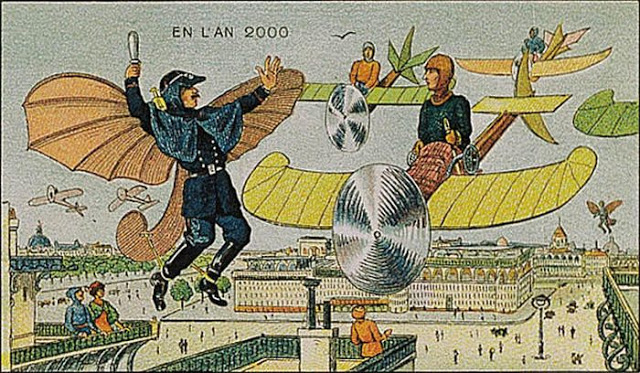06.12.15Headline: Teachers Prove Technology Experts Wrong?

- Previous predictions of the future of ed-tech looked like this. Teachers mostly just went about their business.
I came across this article in EdWeek by Benjamin Herold on Thursday. It bemoans the woeful use of educational technology by teachers and starts off with this observation:
A mountain of evidence indicates that teachers have been painfully slow to transform the ways they teach, despite that massive influx of new technology into their classrooms
From there it proceeds to make a series of assumptions that are pretty telling about how most people tend to predict future events (answer: not very well) and how we see teachers’ roles in making decisions about the classroom:
“The student-centered, hands-on, personalized instruction envisioned by ed-tech proponents remains the exception to the rule,” the article notes.
It then goes on, with a whiff of disapproval in the air: “Surveys suggest that teachers are far more likely to use technology to make their own jobs easier and to supplement traditional instructional strategies than to put students in control of their own learning.”
To which I ask: Is that a bad thing? The author for his part assumes that teachers have failed because they haven’t done what “ed-tech proponents” have said they should. This strikes me as both poorly thought through and typical of the ways that the knowledge of teachers is dismissed. My assumption is that it is more likely that teachers probably got it right in applying new technology in a rational way and that the pundits, alas, were (imagine this!) wrong.
What if the ed-tech types are wrong in their predictions that technology should be used in the classroom–a place, I note, where they mostly don’t work and are never accountable for student outcomes–to “put students in control of their own learning”? That might be right but it’s an awfully big supposition and in fact evidence appears to be pouring in from classrooms that this is not its highest leverage use. But this does not cause the author to question the pundits but to question the teachers.
Let me put this another way: The aggregated knowledge of tens of thousands of people who live with the realities of the technology and learning and who are accountable for student achievement do not agree with a handful of people who are accountable for infusing our classrooms with best-case technology scenarios. Who is more likely to be right? If we weren’t so used to dismissing the knowledge of teachers about their own work, we’d see this immediately and clearly.
So let me just stand up and be the first to say that if our author is indeed correct that teachers “are more likely to use technology to make their own jobs easier and to supplement traditional instructional strategies than to put students in control of their own learning,” then huzzah for that.
If I understand him correctly, teachers have decided en masse that one of the best uses of technology is to make their lives easier, which is to say ‘more efficient,’ which is to say, ‘more productive,’ which is to say to free up their time and energy to do more beneficial things like lesson planning or grading papers or reading the books they need to teach or (yes, this is ok, too) stepping out to grab the occasional sandwich at lunch.
And further they have decided to use technology to tweak and adapt the things they currently do rather than buy wholesale an entirely unproven supposition about the future.
Well, if that doesn’t PROVE the downright good sense and practicality of teachers, I don’t know what does.
To wrap all this up, I’m not really sure who the alleged “ed-tech proponents” are who want to go all paradigm-shift on us–possibly they are full time professional acolytes of bright shiny futures; or else maybe sales people–but we know one thing for certain about their theories:
They are wrong
How do I know that the ed-tech grand theory of disintermediated and perfectly personalized education is wrong? Simple: Same way I know any grand prediction of the future is wrong. Because it is a grand prediction of the future. People who try to predict the future are always wrong. No judgment on them, they just are. They imagine a future based on incomplete knowledge and are overly influecned by the ideas they hold not the ideas to come. This picture, drawn in 1910 to show what 2000 would look is a good example.

The flying policeman, you’ll note, is still wearing spurs. Whoops. And even though the predictor saw the future of flight, he of course radically misapplied how it would work. Perhaps we should bemoan the failure of officers of the law to radically shift policing by flying, as recommended by pol-tech experts. On the other hand perhaps we should just observe that teachers use technology pretty much like the rest of the economy does-to do their job a little better–and a little more sustainably– everyday. That seems to me to be just fine.
In other words the headline should be: Teachers prove technology experts have misunderstood the value and uses of technology in today’s schools.
